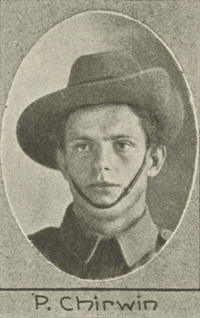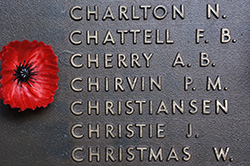Peter Chirvin
| Alias | Peter Chervin |
|---|---|
| Russian spelling | Петр Михайлович Чирвин |
| Born | 21.12.1895 |
| Place | Lugovoy, Sakhalin Island, Far East |
| Ethnic origin | Russian |
| Religion | Russian Orthodox |
| Father | Michael Fedorovich Chirvin (1872-1913) |
| Mother | Natalia Vasilevna Chirvina (b.1879) |
| Arrived at Australia |
from Far East via Moji, Japan on 16.10.1914 per St Albans disembarked at Brisbane |
| Residence before enlistment | Brisbane |
| Occupation | Reporter |
| Naturalisation | Served as Russian subject |
Service #1
| Service number | 1932 |
|---|---|
| Enlisted | 1.02.1915 |
| Place of enlistment | Brisbane |
| Unit | 9th Battalion, 49th Battalion |
| Rank | Private |
| Place | Gallipoli, 1915, Western Front, 1916-1918 |
| Casualties | WIA 1916, 1918 |
| Awards | MM (LG 17.06.19) |
| Final fate | RTA 28.02.1919, suicided 16.04.1919 on board 'Anchises', Sydney Harbour |
| Cemetery | Quarantine Station North Head, Sydney |
Materials
Digitised service records (NAA) (Chirvin)
Digitised recommendation for award (AWM) (Chervin)
Digitised Embarkation roll entry (AWM) (Chervin)
Digitised Roll of Honour circular (AWM) (Chirvin)
Blogs and presentations
Петр Чирвин / Peter Chirvin - «Русские АНЗАКи: Нити потерянной истории»/ Выставка Посольства Австралии в Москве
True to Australia. Peter Chirvin. - One Hundred Stories (Monash University)
Publications
Elena Govor, Russian roots are hidden in Anzac history. - International New York Times, 18 September 2014, p. S3.
Elena Govor, Russian Anzacs and Anzac legends
Newspaper articles
Worried to death. A Russian's suicide. - The Advertiser, Adelaide, 19 April 1919, p. 7.
Soldier commits suicide on board a transport. Mates called him "Bolshevy".. - Barrier Miner Broken Hill, 19 April 1919, p. 9.
Pathetic suicide of Russian-Australian soldier. - The Daily News, Perth, 23 April 1919, p. 4.
"True to Australia". A Russian's death. - Northern Star, Lismore, 23 April 1919, p. 5.
Russian digger's suicide. - Recorder, Port Pirie, 28 April 1919, p. 3.
Soldier suicides. - Truth, Brisbane, 4 May 1919, p. 9.
The making of a Bolshevik. - Daily Standard, Brisbane, 24 July 1919, p. 4.
From Russian Anzacs in Australian History:
In April 1919 the Sydney Morning Herald reported, 'An inquest was held yesterday concerning the death of Peter Chervin [Chirvin], 26, a native of Russia and a member of the A.I.F., who was found hanging from a beam on the troopship Anchises on April 16 while the vessel was in quarantine. Evidence was given that the deceased was depressed and complained of being "ragged owing to being a Russian". Pte James Roberts said that the deceased seemed to be obsessed with the idea that the Bolshevik movement was strong in Queensland, and he was afraid of what might happen after he landed there owing to Bolshevism. He thought he would be looked upon as a German spy.' At the court of enquiry a more forthcoming Roberts stated that, while during the voyage Chirvin 'was quite cheerful & looking forward to getting to Queensland', he changed after his arrival in Australia: 'Since reading of Bolshevic movements in Brisbane he appeared to be afraid of the Bolshevics when he landed in Brisbane. He appeared to be mentally deranged during the last few days & was apparently under the delusion that he was looked upon as a German spy.'
There were people aboard the Anchises who knew that the emphases in this testimony had been adjusted: it was not the Queensland bolsheviks that Chirvin feared, it was his comrades on board the ship. Chirvin had served four years in the AIF, from Gallipoli to France; he was wounded twice and received a Military Medal for his courage as a stretcher-bearer at St Quentin. The day before his death he went to see Lieutenant-Colonel J.S. Denton, who testified, 'he told me that he was being heckled about his nationality. He being a Russian, his comrades calling him "Bolshie". On this point I tried to obtain the names of the offenders but he refused me the information. He served under me in the 49th Battalion & his conduct was exemplary.' Chirvin also told Surgeon L.W. Bond, in whose care he was at the time, that 'his comrades had subjected him to a lot of "ragging" about his Russian parentage'. He told both Denton and Bond he intended to commit suicide.
Chirvin left behind a widowed mother, a peasant woman, in Vladivostok. In 1916, as he headed for France, he had written to her, 'I beg you once more not to worry too much, I think we shall see each other again'. His mother would never forget him and, in spite of all the difficulties facing her, kept trying throughout the 1920s to obtain information from the Australian military about his 'personal effects' and the cause of his death. All she ever got was his medals and some money. As for the court of inquiry -- the coroner returned a verdict of suicide and no action was taken to find the 'offenders'. They went home, jubilant conquerors, to reunite with their loved ones. Chirvin was buried at the North Head Quarantine Cemetery.
Gallery

Peter Chirvin
Queenslander Pictorial, supplement to The Queenslander, 24 April 1915, p. 23

AWM memorial panel 147
 Russian Anzacs
Russian Anzacs